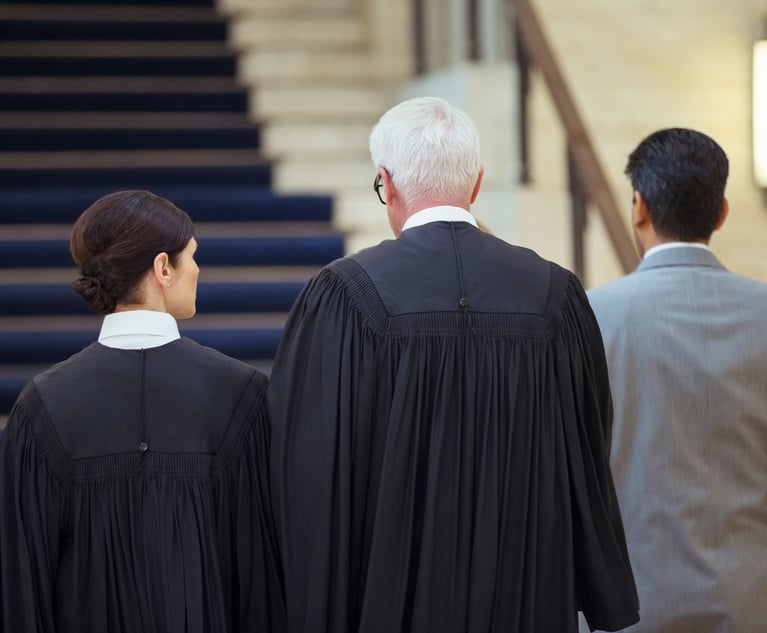Judicial Ethics Opinion 20-30
A judge must disqualify him/herself from a case where two attorneys representing the judge's child in a civil matter are also the public defender and an assistant public defender.
July 23, 2020 at 09:58 AM
7 minute read
The Advisory Committee on Judicial Ethics responds to written inquiries from New York state's approximately 3,600 judges and justices, as well as hundreds of judicial hearing officers, support magistrates, court attorney-referees, and judicial candidates (both judges and non-judges seeking election to judicial office). The committee interprets the Rules Governing Judicial Conduct (22 NYCRR Part 100) and, to the extent applicable, the Code of Judicial Conduct. The committee consists of 27 current and retired judges, and is co-chaired by former associate justice George D. Marlow of the Appellate Division and the Honorable Margaret Walsh, a justice of the Supreme Court.
Digest: Where two attorneys representing the judge's child in a civil matter are also the Public Defender and an assistant public defender: (1) During the representation, the judge (a) must disqualify him/herself, subject to remittal, from matters involving those two attorneys when they appear as public defenders either in the judge's court or the centralized arraignment part but (b) may preside in other matters involving the public defender's office, provided the assistant public defender(s) appearing before the judge have absolutely no involvement in representing the child. (2) Once the child's representation completely ends, disclosure is mandated in lieu of outright disqualification for two years in matters involving the attorneys who represented the judge's child. The judge must fully disclose the past representation, but thereafter has full discretion to determine if recusal is warranted, provided no party is appearing without counsel.
Rules: Judiciary Law § 14; 22 NYCRR 100.2; 100.2(A); 100.2(B); 100.3(E)(1); 100.3(E)(1)(e); Opinions 19-154; 17-150; 16-146; 15-88; 15-45; 14-51; 09-223; 08-165; 07-128; 02-124; 02-56; 98-14; People v. Moreno, 70 NY2d 403 (1987).
Opinion: Two part-time private attorneys represent the judge's first-degree relative in a civil matter. [1] These attorneys also concurrently serve as the Public Defender and an assistant public defender. In their capacity as public defenders, these attorneys appear in the judge's court and/or in the centralized arraignment part where the judge sometimes presides. The judge asks if she/he must disqualify him/herself in matters involving appearances by (a) the Public Defender, (b) the assistant public defender who is representing the judge's child, or (c) other assistant public defenders who have no involvement in the child's civil case. The judge also asks if his/her obligations are different when presiding in the centralized arraignment part.
A judge must always avoid even the appearance of impropriety (see 22 NYCRR 100.2) and must always act to promote public confidence in the judiciary's integrity and impartiality (see 22 NYCRR 100.2[A]). In particular, a judge must not allow family, social, political, or other relationships to influence the judge's judicial conduct or judgment (see 22 NYCRR 100.2[B]). A judge must disqualify him/herself in any proceeding in which his/her impartiality "might reasonably be questioned" (22 NYCRR 100.3[E][1]) or in other specific circumstances as required by rule or law, including when a first-degree relative "is acting as a lawyer in the proceeding" (see 22 NYCRR 100.3[E][1][e]; see also Judiciary Law § 14). Conversely, where disqualification is not mandatory, a trial judge is the sole arbiter of recusal (see People v. Moreno, 70 NY2d 403 [1987]).
During the Representation
In general, a judge must disqualify him/herself in a proceeding where an attorney appearing before the judge also represents the judge's first-degree relative in a proceeding in another court (see e.g. Opinions 15-88; 14-51; 08-165; 07-128; 02-56). In nearly identical circumstances, we said in Opinion 08-165 (citations omitted):
The judge in the present inquiry, therefore, also must disqualify him/herself in any proceeding where the Public Defender appears, either in his/her government capacity or as a private practitioner, while the Public Defender is representing the judge's child. The judge also must disqualify him/herself in any proceeding where a member of the Public Defender's staff who was or still is involved representing the judge's child appears in the judge's court. In either case, such disqualification is subject to remittal. The inquiring judge, therefore, may disclose on the record the basis of his/her disqualification, and, if following such disclosure, the parties who have appeared and not defaulted, and their lawyers, without the judge's participation, all agree that the judge should not be disqualified, and the judge believes that he/she will be impartial and is willing to participate, the judge may participate in the proceedings. The agreement must be incorporated in the record of the proceeding. Remittal is not available, however, when a party is self-represented.
The inquiring judge also asks if he/she must disqualify when other assistant public defenders, who have had absolutely no involvement in representing the judge's child in the civil matter, appear before the judge. Opinion 08-165 (citations omitted) answers this question as well:
With respect to other attorneys on the Public Defender's staff who appear in the judge's court and who have no involvement in representing the judge's child, their partners and/or associates in private practice, or the Public Defender's partners and/or associates in private practice, the Committee has previously advised that where a judge was represented by an assistant public defender in a personal legal matter, the judge need not disqualify him/herself when other assistant public defenders appear before him/her. The Committee is of the view that the same conclusion applies in the present inquiry as well, both as to other attorneys on the Public Defender's staff who have no involvement in representing the judge's child, their partners and/or associates in private practice, and the Public Defender's partners and/or associates in private practice.
We note this is one of a very few instances in which the Public Defender's formal status as attorney of record is not deemed to constitute involvement in all proceedings involving his/her office. [2]
After Representation Concludes
Once the attorneys' representation of the judge's child ends, disclosure is required for a two-year period in lieu of outright disqualification (see Opinions 15-88; 14-51; 08-165; 07-128). Thus, for two years, if either attorney appears before the judge, he/she must disclose the prior attorney-client relationship (see id.). If a party objects to the judge's continued participation, the judge must exercise discretion and determine if recusal is warranted (see id.). [3] Thus, this determination remains within the judge's sole discretion, provided the judge concludes he/she can be fair and impartial.
Centralized Arraignment Part
The judge also asks if his/her ethical obligations vary when the attorneys appear before him/her in the centralized arraignment part. We see no reason to apply a different standard here. We recognize arraignment "is a significant stage in the criminal proceeding when the judge must advise the defendant of his/her rights, issue a securing order, and, in some cases, suspend the defendant's license to drive" (Opinion 09-223). Thus, a judge who knows he/she must disqualify him/herself in a particular case "must do so at the outset and may not first conduct an arraignment" (Opinions 17-150; 09-223; cf. Opinion 19-154 [addressing certain unique disqualification issues pertaining to the centralized arraignment part, where the judge has a conflict with the entire public defender's office]). Accordingly, the same principles apply when the judge is presiding in the centralized arraignment part.
[1] Here, the first-degree relative is the judge's child or step-child, or the spouse of such a person.
[2] We have declined to impute a conflict with an agency head to the entire government law office when it is solely based on (a) that attorney's private law practice (see Opinions 08-165; 02-124; 98-14); (b) a purely social relationship between the judge and that attorney (see Opinion 15-45 ["a judge's obligation to disqualify him/herself based on a social relationship with an attorney does not automatically extend" to the attorney's colleagues or subordinates]); or (c) the judge filing a grievance against that attorney alone (see Opinion 16-146 [explaining rationale]).
[3] Where, as here, the conflict involves a public defender, we assume the other side – i.e., the prosecution – will ordinarily be represented by counsel. For completeness, we nonetheless note that because disclosure is mandated in lieu of outright disqualification the judge must disqualify him/herself during this period if any party is appearing pro se.
This content has been archived. It is available through our partners, LexisNexis® and Bloomberg Law.
To view this content, please continue to their sites.
Not a Lexis Subscriber?
Subscribe Now
Not a Bloomberg Law Subscriber?
Subscribe Now
NOT FOR REPRINT
© 2024 ALM Global, LLC, All Rights Reserved. Request academic re-use from www.copyright.com. All other uses, submit a request to [email protected]. For more information visit Asset & Logo Licensing.
You Might Like
View AllTrending Stories
- 1Call for Nominations: Elite Trial Lawyers 2025
- 2Senate Judiciary Dems Release Report on Supreme Court Ethics
- 3Senate Confirms Last 2 of Biden's California Judicial Nominees
- 4Morrison & Foerster Doles Out Year-End and Special Bonuses, Raises Base Compensation for Associates
- 5Tom Girardi to Surrender to Federal Authorities on Jan. 7
Who Got The Work
Michael G. Bongiorno, Andrew Scott Dulberg and Elizabeth E. Driscoll from Wilmer Cutler Pickering Hale and Dorr have stepped in to represent Symbotic Inc., an A.I.-enabled technology platform that focuses on increasing supply chain efficiency, and other defendants in a pending shareholder derivative lawsuit. The case, filed Oct. 2 in Massachusetts District Court by the Brown Law Firm on behalf of Stephen Austen, accuses certain officers and directors of misleading investors in regard to Symbotic's potential for margin growth by failing to disclose that the company was not equipped to timely deploy its systems or manage expenses through project delays. The case, assigned to U.S. District Judge Nathaniel M. Gorton, is 1:24-cv-12522, Austen v. Cohen et al.
Who Got The Work
Edmund Polubinski and Marie Killmond of Davis Polk & Wardwell have entered appearances for data platform software development company MongoDB and other defendants in a pending shareholder derivative lawsuit. The action, filed Oct. 7 in New York Southern District Court by the Brown Law Firm, accuses the company's directors and/or officers of falsely expressing confidence in the company’s restructuring of its sales incentive plan and downplaying the severity of decreases in its upfront commitments. The case is 1:24-cv-07594, Roy v. Ittycheria et al.
Who Got The Work
Amy O. Bruchs and Kurt F. Ellison of Michael Best & Friedrich have entered appearances for Epic Systems Corp. in a pending employment discrimination lawsuit. The suit was filed Sept. 7 in Wisconsin Western District Court by Levine Eisberner LLC and Siri & Glimstad on behalf of a project manager who claims that he was wrongfully terminated after applying for a religious exemption to the defendant's COVID-19 vaccine mandate. The case, assigned to U.S. Magistrate Judge Anita Marie Boor, is 3:24-cv-00630, Secker, Nathan v. Epic Systems Corporation.
Who Got The Work
David X. Sullivan, Thomas J. Finn and Gregory A. Hall from McCarter & English have entered appearances for Sunrun Installation Services in a pending civil rights lawsuit. The complaint was filed Sept. 4 in Connecticut District Court by attorney Robert M. Berke on behalf of former employee George Edward Steins, who was arrested and charged with employing an unregistered home improvement salesperson. The complaint alleges that had Sunrun informed the Connecticut Department of Consumer Protection that the plaintiff's employment had ended in 2017 and that he no longer held Sunrun's home improvement contractor license, he would not have been hit with charges, which were dismissed in May 2024. The case, assigned to U.S. District Judge Jeffrey A. Meyer, is 3:24-cv-01423, Steins v. Sunrun, Inc. et al.
Who Got The Work
Greenberg Traurig shareholder Joshua L. Raskin has entered an appearance for boohoo.com UK Ltd. in a pending patent infringement lawsuit. The suit, filed Sept. 3 in Texas Eastern District Court by Rozier Hardt McDonough on behalf of Alto Dynamics, asserts five patents related to an online shopping platform. The case, assigned to U.S. District Judge Rodney Gilstrap, is 2:24-cv-00719, Alto Dynamics, LLC v. boohoo.com UK Limited.
Featured Firms
Law Offices of Gary Martin Hays & Associates, P.C.
(470) 294-1674
Law Offices of Mark E. Salomone
(857) 444-6468
Smith & Hassler
(713) 739-1250










